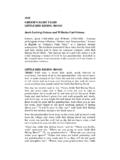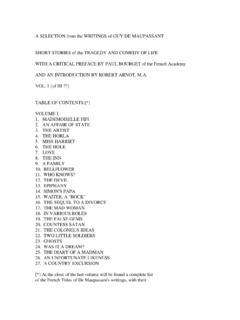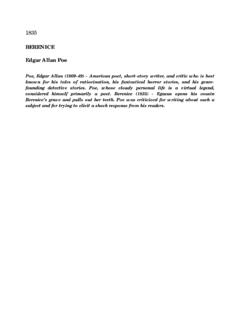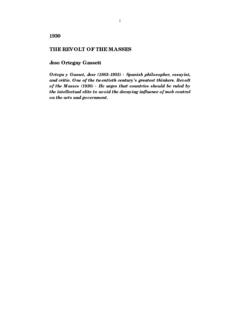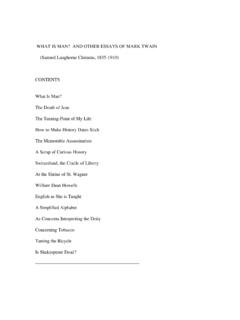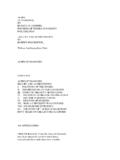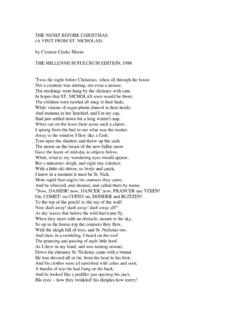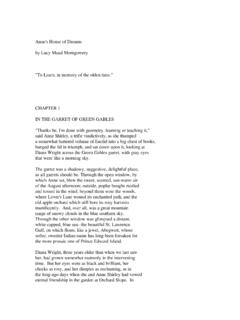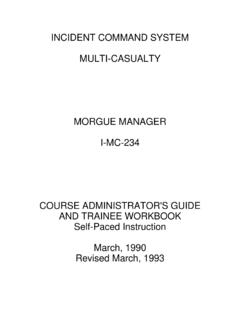Transcription of 1841 THE MURDERS IN THE RUE MORGUE Edgar Allan Poe
1 1841 THE MURDERS IN THE RUE MORGUEE dgar Allan PoePoe, Edgar Allan (1809-49) - American poet, short-story writer, and critic who isbest known for his tales of ratiocination, his fantastical horror stories, and hisgenre-founding detective stories. Poe, whose cloudy personal life is a virtuallegend, considered himself primarily a poet. The MURDERS in the Rue MORGUE (1841) - The police are unable to solve the MURDERS of a mother and her the first detective story, this work made Poe the only American toever invent a form of MURDERS IN THE RUE MORGUETHE MURDERS IN THE RUE MORGUE - What song the Syrens sang, or whatname Achilles assumed when he hid himself among women, although puzzlingquestions are not beyond all conjecture. SIR THOMAS BROWNE, Urn-Burial. THE mental features discoursed of as theanalytical, are, in themselves, but little susceptible of analysis. We appreciatethem only in their effects.
2 We know of them, among other things, that they arealways to their possessor, when inordinately possessed, a source of the liveliestenjoyment. As the strong man exults in his physical ability, delighting in suchexercises as call his muscles into action, so glories the analyst in that moralactivity which disentangles. He derives pleasure from even the most trivialoccupations bringing his talents into play. He is fond of enigmas, ofconundrums, of hieroglyphics; exhibiting in his solutions of each a degree ofacumen which appears to the ordinary apprehension preternatural. His results,brought about by the very soul and essence of method, have, in truth, the wholeair of intuition. The faculty of re-solution is possibly much invigorated bymathematical study, and especially by that highest branch of it which, unjustly,and merely on account of its retrograde operations, has been called, as if parexcellence, analysis.
3 Yet to calculate is not in itself to analyze. A chess-player, forexample, does the one without effort at the other. It follows that the game ofchess, in its effects upon mental character, is greatly misunderstood. I am notnow writing a treatise, but simply prefacing a somewhat peculiar narrative byobservations very much at random; I will, therefore, take occasion to assert thatthe higher powers of the reflective intellect are more decidedly and moreusefully tasked by the unostentatious game of draughts than by all the elaboratefrivolity of chess. In this latter, where the pieces have different and bizarremotions, with various and variable values, what is only complex is mistaken (anot unusual error) for what is profound. The attention is here called powerfullyinto play. If it flag for an instant, an oversight is committed, resulting in injury ordefeat. The possible moves being not only manifold but involute, the chances ofsuch oversights are multiplied; and in nine cases out of ten it is the moreconcentrative rather than the more acute player who conquers.
4 In draughts, onthe contrary, where the moves are unique and have but little variation, theprobabilities of inadvertence are diminished, and the mere attention being leftcomparatively what advantages are obtained by either party are obtained bysuperior acumen. To be less abstract Let us suppose a game of draughts wherethe pieces are reduced to four kings, and where, of course, no oversight is to beexpected. It is obvious that here the victory can be decided (the players being atall equal) only by some recherche movement, the result of some strong exertionof the intellect. Deprived of ordinary resources, the analyst throws himself intothe spirit of his opponent, identifies himself therewith, and not unfrequently seesthus, at a glance, the sole methods (sometimes indeed absurdly simple ones) bywhich he may seduce into error or hurry into has long been noted for its influence upon what is termed the calculatingpower; and men of the highest order of intellect have been known to take anapparently unaccountable delight in it, while eschewing chess as doubt there is nothing of a similar nature so greatly tasking the facultyof analysis.
5 The best chess-player in Christendom may be little more than thebest player of chess; but proficiency in whist implies capacity for success in allthese more important undertakings where mind struggles with mind. When Isay proficiency, I mean that perfection in the game which includes acomprehension of all the sources whence legitimate advantage may be are not only manifold but multiform, and lie frequently among recesses ofthought altogether inaccessible to the ordinary understanding. To observeattentively is to remember distinctly; and, so far, the concentrative chess-playerwill do very well at whist; while the rules of Hoyle (themselves based upon themere mechanism of the game) are sufficiently and generally to have a retentive memory, and to proceed by the book, are pointscommonly regarded as the sum total of good playing. But it is in matters beyondthe limits of mere rule that the skill of the analyst is evinced.
6 He makes, insilence, a host of observations and inferences. So, perhaps, do his companions;and the difference in the extent of the information obtained, lies not so much inthe validity of the inference as in the quality of the observation. The necessaryknowledge is that of what to player confines himself not at all; nor, because the game is the object, doeshe reject deductions from things external to the game. He examines thecountenance of his partner, comparing it carefully with that of each of considers the mode of assorting the cards in each hand; often counting trumpby trump, and honor by honor, through the glances bestowed by their holdersupon each. He notes every variation of face as the play progresses, gathering afund of thought from the differences in the expression of certainty, of surprise, oftriumph, or chagrin. From the manner of gathering up a trick he judges whetherthe person taking it can make another in the suit.
7 He recognizes what is playedthrough feint, by the air with which it is thrown upon the table. A casual orinadvertent word; the accidental dropping or turning of a card, with theaccompanying anxiety or carelessness in regard to its concealment; the countingof the tricks, with the order of their arrangement; embarrassment, hesitation,eagerness or trepidation all afford, to his apparently intuitive perception,indications of the true state of affairs. The first two or three rounds having beenplayed, he is in full possession of the contents of each hand, and thenceforwardputs down his cards with as absolute a precision of purpose as if the rest of theparty had turned outward the faces of their analytical power should not be confounded with simple ingenuity; for whilethe analyst is necessarily ingenious, the ingenious man is often remarkablyincapable of analysis. The constructive or combining power, by which ingenuityis usually manifested, and which the phrenologists (I believe erroneously) haveassigned a separate organ, supposing it a primitive faculty, has been sofrequently seen in those whose intellect bordered otherwise upon idiocy, as tohave attracted general observation among writers on morals.
8 Between ingenuityand the analytic ability there exists a difference far greater, indeed, than thatbetween the fancy and the imagination, but of a character very strictlyanalogous. It will found, in fact, that the ingenious are always fanciful, and thetruly imaginative never otherwise than narrative which follows will appear to the reader somewhat in the light of acommentary upon the propositions just in Paris during the spring and part of the summer of 18__, I therebecame acquainted with a Monsieur C. Auguste Dupin. This young gentlemanwas of an excellent indeed of an illustrious family, but, by a variety ofuntoward events, had been reduced to such poverty that the energy of hischaracter succumbed beneath it, and he ceased to bestir himself in the world, orto care for the retrieval of his fortunes. By courtesy of his creditors, there stillremained in his possession a small remnant of his patrimony; and, upon theincome arising from this, he managed, by means of a rigorous economy, toprocure the necessaries of life, without troubling himself about its , indeed, were his sole luxuries, and in Paris these are easily first meeting was at an obscure library in the Rue Montmartre, where theaccident of our both being in search of the same very rare and very remarkablevolume, brought us into closer communion.
9 We saw each other again and was deeply interested in the little family history which he detailed to me withall that candor which a Frenchman indulges whenever mere self is the theme. Iwas astonished, too, at the vast extent of his reading; and, above all, I felt mysoul enkindled within me by the wild fervor, and the vivid freshness of in Paris the objects I then sought, I felt that the society of such a manwould be to me a treasure beyond price; and this feeling I frankly confided tohim. It was at length arranged that we should live together during my stay in thecity; and as my worldly circumstances were somewhat less embarrassed than hisown, I was permitted to be at the expense of renting, and furnishing in a stylewhich suited the rather fantastic gloom of our common temper, a time-eaten andgrotesque mansion, long deserted through superstitions into which we did notinquire, and tottering to its fall in a retired and desolate portion of the FaubourgSt.
10 The routine of our life at this place been known to the world, we shouldhave been regarded as madmen although, perhaps, as madmen of a harmlessnature. Our seclusion was perfect. We admitted no visitors. Indeed the locality ofour retirement had been carefully kept a secret from my own former associates;and it had been many years since Dupin had ceased to know or be known inParis. We existed within ourselves was a freak of fancy in my friend (for what else shall I call it?) to be enamoredof the Night for her own sake; and into this bizarrerie, as into all his others, Iquietly fell; giving myself up to his wild whims with a perfect abandon. Thesable divinity would not herself dwell with us always; but we could counterfeither presence. At the first dawn of the morning we closed all the massy shuttersof our old building; lighted a couple of tapers which, strongly perfumed, threwout only the ghastliest and feeblest of rays.
